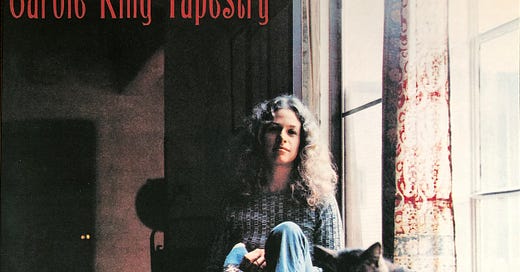I used to feel so uninspired
Carole King - '(You Make Me Feel Like A) Natural Woman' (Tapestry - 1971)
There are only two songs on Carole King’s second album, recipient of multiple Grammy Awards, that previously hit the charts for other artists; The Shirelles’ ‘Will You Still Love Me Tomorrow?’ in 1960 and the closing track, ‘(You Make Me Feel Like A) Natural Women’ by Aretha Franklin in 1967. You also have the covers that came after - James Taylor’s version of ‘You’ve Got A Friend - a US #1, Quincy Jones’ ‘Smackwater Jack’ and both ‘Beautiful’, the opening track of Barbra Joan Streisand Streisand’s thirteenth album and ‘Where You Lead’ on the same record.
For me, this gives the album the slight air of one of those tribute albums where many artists re-record a songwriter’s back catalogue, and you end up with Two Rooms: Celebrating the Songs of Elton John & Bernie Taupin, Leonard Cohen tribute I’m Your Fan or ABBAmania. Of course, as these are King songs1 it is a reverse of the usual process.
There is a sense of closure, or at least bookending the first act of King’s career by including "‘Will You Still Love Me Tomorrow?’ and ‘…Natural Woman’ on this album , the former was the first song she co-wrote with Gerry Goffin and set them up to be a songwriting team at the start of the 1960s. Whereas the latter was the last before they split.
One of the exciting elements to the writing of ‘…Natural Woman’ was the remarkable genesis of the song, Lou Adler said in 2008;
Last year I spoke to Jerry Wexler at his home in Florida, and he told me the story that Gerry was coming out of a building in New York, (Goffin now remembers it as an Oyster House), and Jerry Wexler is passing in a car and yells out, ‘Why don’t you write a song called 'Natural Woman’?‘ They felt the title was so distinct and so important to the song that they gave him a piece of it. So, when I spoke to Jerry recently to call him on his 90th birthday, he said, 'Isn’t it amazing what those kids gave me? The checks keep coming in and I’m really happy about it.’ Knowing how much he added to the song, not really as a third writer but the title and the inspiration of what was to be, a great song.
After this roadside request, the songwriting duo went home to New Jersey and generated a hit for Aretha Franklin to ring the glory out of every second on her version.
On Tapestry, the song is more intimate and in touch with the album's persuasive mood. It is as if King wanted it to sound like demos for other acts to turn into hits; it has a light and airy feel, whereas Franklin’s version is punchy, feels like it is calling beyond our astral plane2 and it certainly doesn’t feel like it will wobble into jazz at any given moment. It is a song that closes one chapter of King’s life and finishes an album, that is sometimes a little downbeat and maudlin, with a note of positivity.
To get there, King sells us a gloomy, disappointed protagonist. Uninspired in life and songwriting and maybe even depressed before '“he” comes along and claims her soul from the lost and found. This is where the track’s legacy becomes interesting. You can take the view that a man lifts up the woman in the song and that Goffin wrote these lyrics and it doesn’t sound like the kind of writing that would pass the Bechdel test; however, the song has moved somewhere else with both Franklin and King’s versions seen as celebratory and empowering for women. To this extent, the song was used three separate times in Murphy Brown and the second of which was pastiched in The Simpsons.
It is also interesting to read some minor contemporary criticism of the album for seeming apolitical in an era where comparisons were made between King, Joni Mitchell - who was recording Blue next door, and the more political and societal reflections of other 1971 works like Marvin Gaye’s What’s Going On?
I would strongly suggest the songs on Tapestry would not be improved by featuring references to Vietnam more often as the material, especially “…Natural Woman”, is so elevated by the lived-in experience of King herself planting a flag in her work a few years after the song was first a hit3
To bring the tribute album nature full-circle, in 1995, several artists, including Rod Stewart, Eternal and The Bee Gees, covered the album on Tapestry Revisited: A Tribute to Carole King, and it was Celine Dion that was entrusted with tackling this song.
It’s probably best that the last word goes to Franklin and King.
King/Goffin and King/Goffin/Wexler songs to be accurate in the case of ‘Will You Still Love Me Tomorrow’ and ‘(You Make Me Feel Like A) Natural Women’
It also features in one scene in Alan Yentob’s Cracked Actor portrayal of David Bowie where Bowie imagines himself as a fly in a glass of milk, and you can see the genesis of Young Americans take route in the back of the limo winding through the desert mountains.
Given that the cat on the front of the album is called Telemachus, one interpretation of what she did with covering the first and last songs she wrote with her ex-husband was fighting from afar - Tēlemakhos in Greek.




